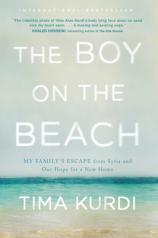The Boy on the Beach: My Family's Escape from Syria and Our Hope for a New Home
Review
The Boy on the Beach: My Family's Escape from Syria and Our Hope for a New Home
When the briefly lit promise of the Middle East “Arab Spring” movement descended into brutal civil war for Syria, the majority of its citizens were as confused and terrified as any of us would be on seeing familiar neighborhoods suddenly enveloped by tanks, gunfire, poison gas and bombs.
Almost overnight, the well-earned comfort, pleasure, security, amenities and cultural vitality of Syria’s energetic and productive middle classes were ripped away, to be replaced by fear, uncertainty, deprivation, loss, internal and external displacement, and death. And we could see it televised in vicious clarity every day.
As she so vividly describes in THE BOY ON THE BEACH, Tima Kurdi (who became a Canadian citizen some years before the Syrian war broke out) experienced the catastrophic upheavals in her homeland on multiple levels: as a worried native Syrian separated from her extended family; as a North American, feeling both confused and helpless at the growing humanitarian crisis; and as the aunt of Alan Kurdi, the drowned toddler whose lifeless body on a Turkish beach was captured in an iconic 2015 photo that galvanized the world into action.
Not surprisingly, Kurdi’s powerful and emotionally compelling account is not just about one little boy who was not even old enough to speak in complete sentences when he and his older brother slipped from their distraught father’s arms into the sea while trying to reach the relative safety of Europe. Hundreds, maybe thousands, of infants and youngsters have been lost in the same way. It’s not so much their personal stories that are gone forever, but their vast potential as human beings on the verge of shaping the next generation.
"THE BOY ON THE BEACH is one of the most compelling narratives you’ll ever read in support of basic human dignity."
In THE BOY ON THE BEACH, Kurdi vividly, nostalgically and poignantly documents (with the instrumental aid of writer Danielle Egan) how she was compelled to respond to the politically created tragedy that robbed her family and so many others of young lives.
From being “only a hairdresser,” her incessantly frustrating attempts to navigate through the unrealistic refugee documentation demands of the Canadian government (previous and current) turned her into a passionate and effective advocate for greater compassion and efficiency at every stage in the family sponsorship process.
While affirming that international politics caused the global refugee tragedy and could reverse it, she adamantly refuses in her book and in numerous interviews to endorse any “side” involved in the conflict that has all but destroyed the millennia-old culture of Syria. However, she does express admiration for a few world leaders, such as German chancellor Angela Merkel, whose stance on refugee aid has, for many, transcended partisan politics.
Not surprisingly, a recurrent theme of THE BOY ON THE BEACH is that of cultivating awareness, rousing the international community at all levels to build sustainable and productive solutions to the world’s ever-growing refugee problem.
Kurdi often uses the image of sleep; little Alan’s heart-rending picture woke the world up, but it’s often been a difficult challenge for Kurdi (whose family formed its own charitable foundation) to keep it awake. With the changing fortunes of major governments, economies, and ongoing conflicts in Syria and elsewhere, there have been plenty of distractions to desensitize people to those millions who continue to live in limbo without safe shelter, food, medical care, education or any of the basic dignities of life.
And so the story really does not end here. Like countless others who managed to escape to an impoverished freedom across the sea, some of Kurdi’s large and loving family have since joined her in Canada; others are scattered all over Europe, and still others, including her aging father, remain in their devastated country clinging to a fading hope that life might one day return to “normal.”
Kurdi reinforces the inescapable truth that as long as fellow human beings are displaced in their millions by callous, cruel and incompetent fake governments, the rest of the world will be challenged to share its available resources with them. THE BOY ON THE BEACH is one of the most compelling narratives you’ll ever read in support of basic human dignity.
Reviewed by Pauline Finch on August 24, 2018
The Boy on the Beach: My Family's Escape from Syria and Our Hope for a New Home
- Publication Date: August 21, 2018
- Genres: Memoir, Nonfiction
- Hardcover: 272 pages
- Publisher: Simon & Schuster
- ISBN-10: 1982108517
- ISBN-13: 9781982108519




